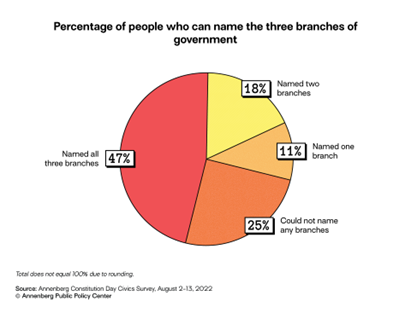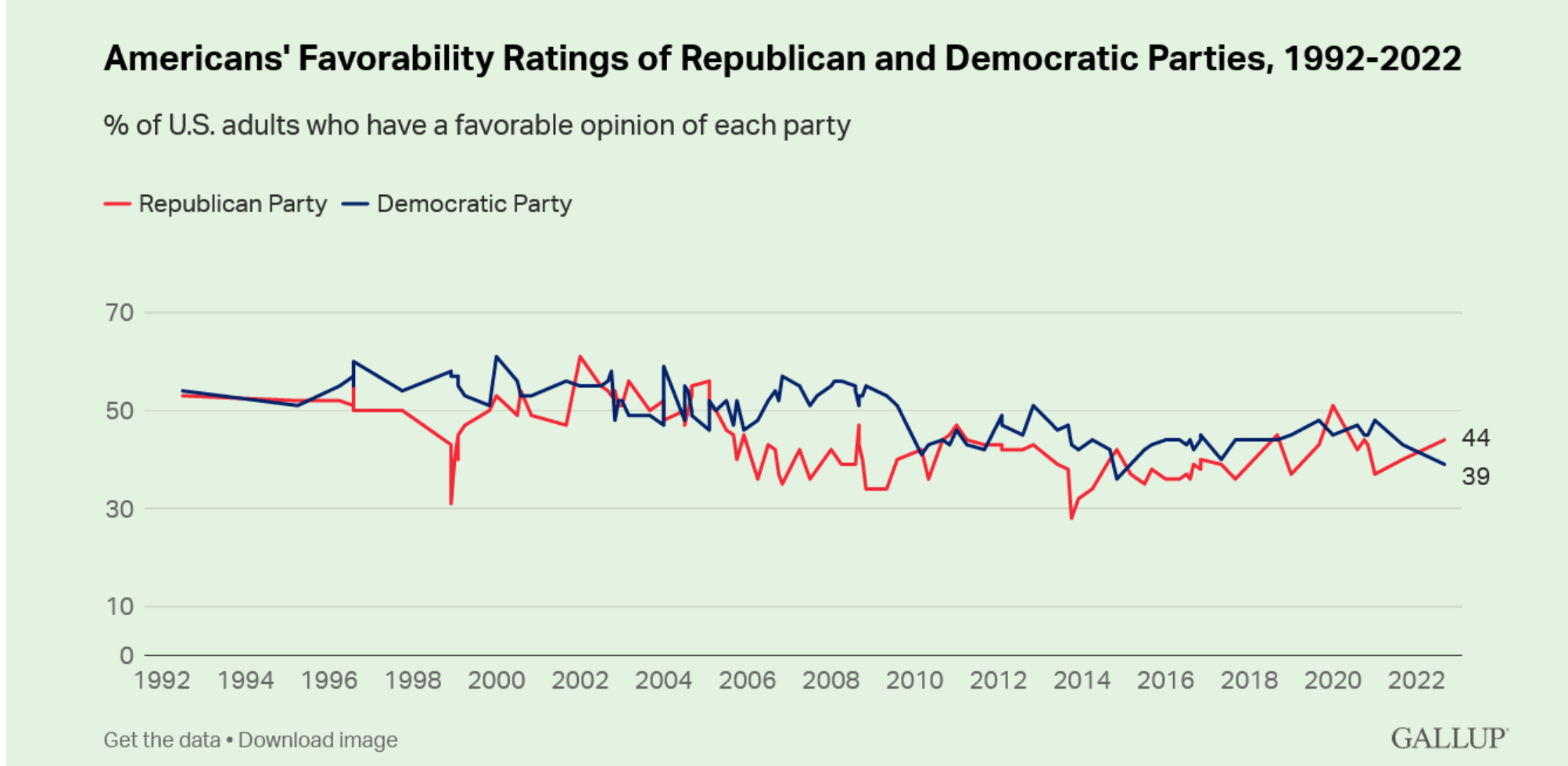The Daily Escape:

Early fall, Andover, ME – October 2022 photo by Eric Storm Photo
A lethal combination for democracy in America may be that not only do we field very weak candidates who hardly know how government works, but Americans are also woefully ignorant about our government.
The Annenberg Public Policy Center released its annual Civics Knowledge Survey in September. It focuses on the public’s understanding of the US Constitution. Here are some of its 2022 findings:
- Less than half (47%) of US adults could name all three branches of government (executive, legislative, judicial), down from 56% in 2021. Here’s a chart of their findings on the branches of government:

A quarter couldn’t name any branch!
When asked to name the protections specified in the First Amendment, the number of respondents who could identify them had declined:
- Freedom of speech was cited by 63%, down from 74% in 2021.
- Freedom of religion was named by 24%, down from 56% in 2021.
- Freedom of the press was named by 20%, down from 50% in 2021.
- Right of assembly was named by 16%, down from 30% in 2021.
- Right to petition the government was named by 6%, down from 20% in 2021.
Note how dramatically these results have shifted in just one year.
Over half (51%) said (incorrectly) that Facebook is required to let all Americans express themselves freely on its platform under the First Amendment. The First Amendment applies to the government not to private companies.
Kathleen Hall Jamieson, director of the Annenberg Public Policy Center said:
“When it comes to civics, knowledge is power….It’s troubling that so few know what rights we’re guaranteed by the First Amendment. We are unlikely to cherish, protect, and exercise rights if we don’t know that we have them.”
The precipitous decline in the First Amendment responses has Wrongo questioning whether the survey was performed accurately.
Perhaps unsurprisingly, Annenberg found that having taken a high school civics class continues to be associated with correct answers to civics knowledge questions. In 2022, nearly two-thirds (65%) of respondents with at least some high school education said they had taken a civics course in high school that focused on the Constitution or judicial system, about the same as in previous years. More than a third of those with at least some college education (36%) said they had taken a college course that focused on the US system of government and the Constitution, significantly fewer than in 2021.
Yet, according to the Center for American Progress, only nine states and the District of Columbia require one year of US government or civics, while 30 states require a half year and the other 11 states have no civics requirement. This may explain why Americans are so weak on how their government operates.
Can we link Annenberg’s results about poor civic knowledge with this Gallup poll showing that Americans’ views of the two major US political parties remain more negative than positive? It also shows that the Republican Party’s favorability is now better than the Democratic Party’s:

The GOP’s favorable rating has edged up by four percentage points to 44%, while the Democratic Party’s rating slipped by the same amount, to 39%. With our political gridlock, along with high inflation and economic uncertainty, it’s understandable that neither Party gets high marks. But why did the Republicans’ position improve over last year? Is it that Biden’s poor ratings are dragging the Democratic Party down?
In October, 2021, Biden’s approval numbers stood at 45%. Today, he’s at 42.1%. That means he’s dropped 3 percentage points while the Party has dropped 4%. It definitely looks like he’s a drag on the whole Party. Since Annenberg tells us that only 47% of us can name all three branches of government, maybe we can conclude that Americans are getting their negative opinions about the two Parties from cable news.
Does anything explain the results of these two polls? Blog reader David P. offered a different view of Wrongo’s column on “Democracy Fatigue” in a comment. He says:
“Democracy Fatigue may be a misnomer. “Politics Fatigue” is closer to what I see around me and struggle to fight off in myself. The amount of money, airtime, phone messages, snail mail, etc. seems disproportional to discernible progress. News about scandal, verbal embarrassments and tactical mishaps outweighs discussion of policy alternatives or actual policy achievements.”
Has America just become too numbed by the news media “flooding the zone” with scare headlines about crisis after crisis to care much about something real – like the threat Republicans pose to our democracy?
Maybe our democracy is in peril not just because of poor civics knowledge. It’s always been a joke how badly people do when asked about the workings of government.
Maybe it’s that we’ve just tuned out. If so, goodbye democracy.
